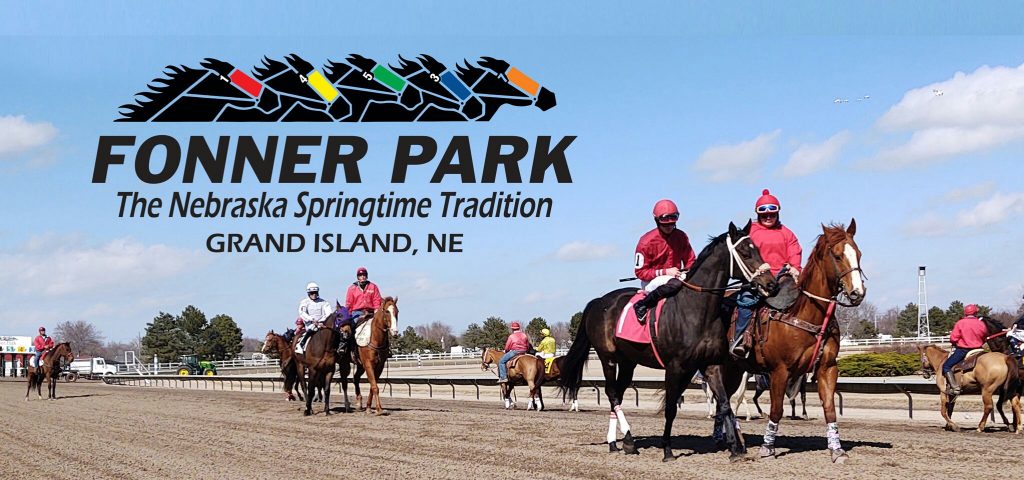
By now, most horse players know about Fonner Park in Nebraska. But how much do they really know about Fonner?
Called “The Nebraska Springtime Tradition,” the spring meet at Fonner is their Keeneland with packed stands every weekend. Sadly, this year there are no fans in attendance. In fact, Fonner almost didn’t run at all. When horsemen were told March 14 that Fonner would stop racing because of the COVID-19 they went to management. All reached an agreement to stay open for two weeks with some adjustments and make further decisions at the end of that period.
Normally running Fridays, Saturdays and Sundays, Fonner went to the Monday-through-Wednesday schedule where it would be at a higher profile for simulcast bettors. The hope was that the shift in the schedule would result in added handle. And it worked nicely.
After the schedule change Fonner’s handle hit a 67-year record of $2.8 million on March 31 following four record-breaking days all reaching seven figures. The Park’s previous high handle averaged $600,000 in the early 2000s.
The boost in handle allowed Fonner Chief Operating Officer Chris Kotulak to make an easier decision to keep racing. He announced Fonner has extended the temporary meet through April ending May 2.
“The answer is yes, we are going to continue,” Chris Kotulak told TDN. “We were very pragmatic about this and knew what we needed to accomplish to stay open. We have exceeded our expectations. Having other tracks shut down has certainly helped us. We’ve been in the limelight and the lights have been cranked up. It’s not just the U.S. and Canada. They are betting on us in Australia, in South America.”
So if you, too, are fond of Fonner, get ready for action Monday, Tuesday and Wednesday at the Grand Island race track. First post 4 p.m. Watch on TVG! Live stream on https://fonnerpark.com/2020-schedule/
The signature race of the meet is the Bosselman Pump and Pantry/Gus Fonner Stakes, scheduled to run April 25 with an advertised purse of $75,000, the race may be rescheduled for April 29. The race also may be run with a reduced purse. According to Kotulak, the race’s long-time sponsor, Bosselman Energy, which has put up $40,000 of the purse in past years, told management that it cannot afford to do so this year because declining business due to the coronavirus. However, Kotulak still expects the race will attract one of the best fields in its history.
Speaking of history — on April 29, 1995, I’ma Game Master (Jaklin Klugman) and Glaring (Known Fact) combined to create one of the most exciting races in Fonner Park’s history by finishing in a deadheat in the Bosselman/Gus Fonner Handicap. Ten tense minutes passed after the horses crossed the finish line before the race is declared — a tie!
The Fonner Park Family
A boy who loved horses and all things wild grew up and rode in the Buffalo Bill Cody’s Wild West Show. August Lewis “Gus” Fonner was born in 1873. His father died when he was very young and he was close to his mother. The homestead where he lived was very close to the first store in Grand Island called the O.K. Store. The ranch later became known as the O.K. Farm.
Gus traveled all over the west creating an impressive collection of Indian and Old West memorabilia. Through his travels he became an honorary member of many Native American tribes. Fonner understood Plains Indian culture very well.
Gus Fonner was an important person in Grand Island’s history because he was one of the first donors to the Stuhr Museum as well as the making of Fonner Park which was named in his honor. An avid horseman, he loved livestock and donated the land where Fonner Park racetrack is located. Fonner Park is one of the biggest attractions in Grand Island.
August L. “Gus” Fonner died on Dec. 17, 1959 at age 86. In his honor, The Gus Fonner Memorial Rotunda houses the beautiful noted collections formerly belonging to the late Grand Island civic leader. The fascinating exhibits reflect the contrasting cultures of the Plains Indians and the early western settlers.
The center of the Fonner Rotunda is reigned by this life-sized sculpture of a Sioux Indian family, titled “The Arrowmaker.” Done in plaster and bronze coated, an Indian boy watches intently as his father sights down an arrow to test its trueness. Behind them stands the mother, an interested observer, in the piece created by sculptor Ellis Burman.
You can visit the Gus Fonner Memorial Rotunda, open year round, at the
Stuhr Museum of the Prairie Pioneer, 3133 West Highway 34, Grand Island, NE 68801.
Extended Family
On July 31, 2019, Bruce Swihart retired as CEO of Fonner Park. Chris Kotulak, Chief Operating Officer since July 2018, was named as new CEO.
Swihart had been employed at Fonner Park in Grand Island for 43 years, hired as administrative assistant in October 1976. Bruce also worked as assistant general manager under longtime Fonner GM, Hugh Miner Jr. He was known for being even-keeled, extremely organized and a meticulous bookkeeper. His father Al Swihart was the Fonner general manager from 1956 until his death in 1983.
A native of Grand Island, Swihart’s commitment to the racing operations and his hometown, was steadfast and sincere. In his tenure he saw the facility grow well beyond horse racing. Fonner Park evolved into a campus of a year-round keno facility, a 6,000-seat entertainment arena, and an array of giant livestock and show buildings that are home to the Nebraska State Fair and numerous other events throughout the year.
Chris Kotulak began his career in horse racing as a teenager, when he worked with Thoroughbreds on the backstretch of Ak-Sar-Ben racetrack in his hometown of Omaha. A self-trained track announcer with an Applied Sciences Degree in Photography, Chris worked for 11 years on the Nebraska racing circuit, calling races and marketing at Fonner Park (1986 to 1994), Ak-Sar-Ben in Omaha, State Fair Park in Lincoln and Ag Park in Columbus.
After leaving Nebraska to call races at Louisiana Downs, Kotulak was also a popular television analyst for TVG in Los Angeles. Chris was a full-time track announcer at Hollywood Park and Delta Downs. He then moved to Remington Park in Oklahoma City in 2011 where he served as a television analyst and marketing and communications assistant.
In April 2018 Kotulak was in Grand Island for the funeral of his close friend Todd Otto. Otto had been chief operating officer at Fonner for a number of years. While there Chris had a brief conversation with Fonner CEO Bruce Swihart and told Bruce he’d be happy to help out if there was anything he could do.
Three months later Kotulak would be named COO of Fonner taking over for his friend. A year later Chris Kotulak would take over as CEO for Bruce Swihart and in less than 8 months he would be faced with the most complex situation in Fonner’s history.
One other item of interest. Chris Kotulak also wrote THE book on Van Berg. Marion and Jack Van Berg. The book, published in April 2013, is entitled
“JACK, from Grit to Glory A Lifetime of Mentoring, Dedication and Perseverance.” The description on Amazon is as follows: The real life drama and stories of a genuine American Legends and horse racing icons. A heart-wrenching, artful and often humorous account of the hardscrabble roots of the Van Berg family. The book paints the paths of the colorful careers of Jack Van Berg, and his father Marion H. Van Berg; both led to horse racing’s highest honor – The Kentucky Derby. There are detailed descriptions and anecdotes of the countless devoted Van Berg employees (Bill Mott, Wayne Catalano, Frankie Brothers, etc…), who went on to achieve tremendous success themselves. The Van Bergs trained horses but they are both noted for having created men. For decades, Jack has been referred to as being like a John Wayne character. The remarks and recollections told by Jack and others explain why. Tough love, leadership and devotion are all showcased in this jewel of a biography.
Kotulak and Van Berg would go on book signing tours to greet fans and retells stories. Columbus, Neb. native, Jack Van Berg, member of the National Museum of Racing and Hall of Fame, died December 27, 2017 at Baptist Health Medical Center-Little Rock, Little Rock, Ark. The 81-year-old Eclipse Award winner for Outstanding Trainer had amassed 6,457 career wins.
The Legend of Leaping Plum
Leaping Plum is a legend in Nebraska. In Nov. as a 2-year-old he broke his maiden first out at 5 1/2 furlongs at Thistledown. From age four to age 12 he won or placed in 32 stakes races at distances from 4 to 6 1/2 furlongs by 12 1/2 lengths with a speed figure of 120.
At three Leaping Plum ran at the allowance level at Thistledown, Ak-sar-ben and Fonner. Emerging as a 4-year-old stakes monster gobbling up record win, he would own two race for the next few years. The Coca-Cola Sprint and the Grasmick Handicap.
The great grandson of Northern Dancer and Dr. Fager would kick off his 4-year-old campaign on February 18, 1995 with his first win in the 4 furlongs Grasmick Handicap at Fonner Park. Yes, 4 furlongs. Just hold on.
April 1, Leaping Plum would go gate-to-wire to win the 6 furlongs Coca-Cola Sprint (Black Type) with a speed figure of 120. Four weeks later he won his third stakes in a row, the 6 1/2 furlongs Tondi Budweiser H. (Black Type) by 12 1/2 lengths, again, with a speed figure of 120.
After a lackluster performance in the Beef State S. and a four-month layoff, Leaping Plum would take the Speed H. with a speed figure of 112 at Lincoln Race Course. He would finish the year at Hawthorne running at the allowance level.
In 1996 the stalwart gelding was back at the wire in the Grasmick and the Coca-Cola. He would win both stakes the next two years. At ages 8 and 10, Leaping Plum would place second in the Coca-Cola Sprint H. and at age 9 he would take third.
Leaping Plum took every edition of the Grasmick Handicap from 1995 to 2001 setting a record for consecutive stakes wins. After finishing third in 2002, he came back to win it for an eighth time the following year at age 12. With one start at 13 after a nine-month layoff, Leaping Plum would go out with a fourth place fittingly in his signature race.
His most dominant performance in the Grasmick came in 1996, when the gelding led at every point of call to win by 8 1/2 lengths and set the Fonner Park track record for a half-mile in 44.20 seconds, a mark that still stands.
The chestnut started almost every year with wins: 1995 and 1996 three stakes wins; 1997 and 1998 two stakes wins; 1999 and 2000 a stakes and an allowance win followed by stakes placed; 2001 and 2003 stakes win and two stakes placed.
Leaping Plum finished his career with 29 wins, 9 seconds and 12 thirds in 66 starts for earnings of $371,584. He spent the last few years of his life on the farm of Margaret Landis in Grand Island and died peacefully in his pasture in 2017. He was 26.
The son of Lightning Leap was bred in Kentucky by Marty Takacs and purchased by Clyde Woods for $11,000 at Keeneland in 1992. He was co-owned by Woods and Paul Miskimins. Joseph Moss trained the resolute gelding for all of his 66 career starts.



